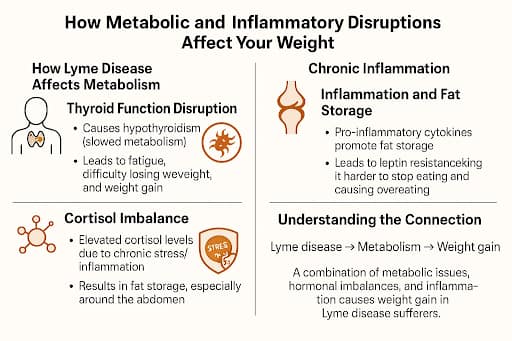
Ever wondered why, despite your best efforts, the scale doesn’t seem to budge?
For those battling Lyme disease, weight gain can be more than just a result of poor diet or inactivity. In fact, your body might be holding on to more than just extra calories. Chronic inflammation, hormonal imbalances, and metabolic disruptions caused by Lyme disease can all contribute to unexpected weight gain.
But the real question is—how much of it is water, and how much is fat?
Let’s uncover the hidden links between Lyme disease and weight gain, and how understanding this connection could help you regain control over your health. Keep reading to find out more!
The Metabolism Disruption

- Lyme disease leads to weight gain through its impact on the endocrine system, particularly the thyroid gland.
- Lyme bacteria affect the body’s ability to regulate hormones that leads to a condition called Hypothyroidism.
- Thyroid hormones are vital for regulation of metabolism, and under activity thyroid slows down the body’s energy usage. This under activity or slow down results in symptoms such as fatigue, depression, and difficulty in losing weight or weight gain as the body becomes less efficient in burning calories.
- Lyme disease affects other hormonal levels. For instance, cortisol causes weight gain, particularly around the abdomen region. Due to the chronic illness or stress, the levels of cortisol elevate. This makes it harder for the body to maintain a healthy weight.
- Another factor contributing to weight gain in Lyme disease patients is chronic inflammation. The infection triggers the release of pro-inflammatory cytokines that affects the body’s immune response.
- Prolonged or persistent inflammation can lead to a condition called leptin resistance. This is a condition where the brain no longer responds to the hormone leptin. It leads to overeating, further causing weight gain.
- Lyme disease progresses resulting in increased weight despite normal or reduced calorie intake.
Water, Fat, or Both? Understanding What You're Gaining

Weight gain in Lyme disease patients often arises from a combination of factors such as inflammatory edema, lymphatic congestion, and series of metabolic disruptions.
It is crucial to distinguish between these for effective management.
Differentiating and determining whether the weight gain is due to fluid retention or fat accumulation with context to the Lyme disease is crucial.
- Notice the Pattern of Swelling: Fluid retention causes swelling in localized areas. For instance, in the legs or abdomen. This may fluctuate throughout the day.
- Response to Detoxification: If there is significant improvement with lymphatic support and detoxification strategies, this suggests fluid retention.
- Duration and History: If there is persistent weight gain without any significant changes in body shape that may indicate accumulation of the fat.
Consulting a medical professional or healthcare provider experienced in Lyme disease can help in differentiating between these causes and guide with treatment strategies.
The Role of Co‑infections and Gut Health

Lyme disease with chronic Lyme reports consistent gastrointestinal (GI) symptoms that do not respond to typical treatments.
Your gut is not just the place where digestion occurs. If your body is fighting a systemic infection like Lyme disease, this immune response can disturb gut function in several ways.
- Inflammation: Lyme illness triggers inflammation throughout the body. So the lining of the intestine also is in an inflammatory condition. This leads to symptoms such as gas, discomfort, bloating, and so on.
- Immune disruption: Lyme causes the immune system to also disrupt the healthy tissues, too.
- Microbiome disturbance: The infection and antibiotics that are used to treat Lyme disease disturb your gut flora, playing a key role in digestion and absorption of nutrients.
The gut or gastrointestinal tract is affected and causes delayed gastric emptying, motility changes, and food sensitivities. This leads to issues such as Irritable Bowel Syndrome (IBS) or Inflammatory Bowel Disease (IBD), which can also lead to misdiagnosis.
Lifestyle Factors That Matter

Simple daily practices can support gaining healthy weight. Let us take a look at the lifestyle changes or additional factors one can incorporate.
- Enhanced Eating Schedules and Chewing Practices: Eat at regular times to support digestive rhythms. Chew slowly and thoroughly to ease the workload on your gut and improve digestion.
- Hydration and Gut Motility: Hydration is necessary when dealing with Lyme disease. One suspecting Lyme disease and stomach problems drink water throughout the day. Herbal supplements and warm lemon water will help in minimizing bloating issues and help in enhancing motility.
- Gentle movements and Abdominal Massage: Lights walk post- meals promote digestion and support bowel movement.
- Meditation: Deep and slow breathing helps to calm the nervous system and aids in gut- brain connection.
- Medications: One should consult a doctor or physician in order to combine holistic approaches with the pharmacological approach.
Conclusion
- Understanding the connection between Lyme disease and weight gain is crucial for effectively managing your health.
- While inflammation and fluid retention are common culprits, Lyme disease can also disrupt your metabolism and hormonal balance, leading to fat accumulation.
- Remember, weight gain in Lyme disease isn’t just about the scale—it’s about understanding your body’s unique response to the illness and finding the right approach to support your healing journey.
What’s Next for You?
Ready to explore a more complete path to recovery? Join the Lyme Support Network Community.
References
- Kavanaugh, Bryan MD*; Seymour, Bridget MD; Kozuch, Patricia MD. Lyme Disease Presenting with Gastroparesis and Cranial Nerve Vii Palsy: 846. American Journal of Gastroenterology 103():p S332, September 2008. Official journal of the American College of Gastroenterology | ACG
- Dig Deeper – Gastrointestinal Complications of Lyme disease. Lymebasics.org. https://lymebasics.org/reference-information/gastrointestinal-complications-of-lyme-disease/
- Gastrointestinal Symptoms of Lyme Disease – Project Lyme. Project Lyme. https://projectlyme.org/gastrointestinal-symptoms-of-lyme-disease/
- Center, Johns Hopkins Lyme Disease Research. 2020. “Think the Lyme Disease Rash Is Always a Bullseye? THINK AGAIN!” Johns Hopkins Lyme Disease Research Center. May 7, 2020. [Johns Hopkins Lyme Disease].


